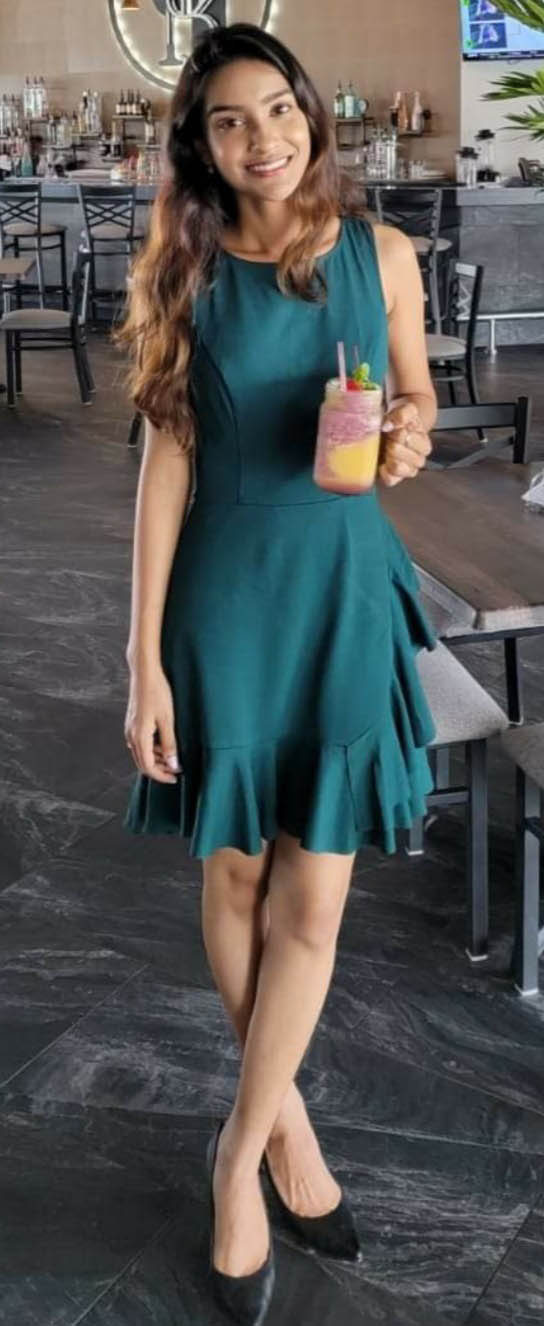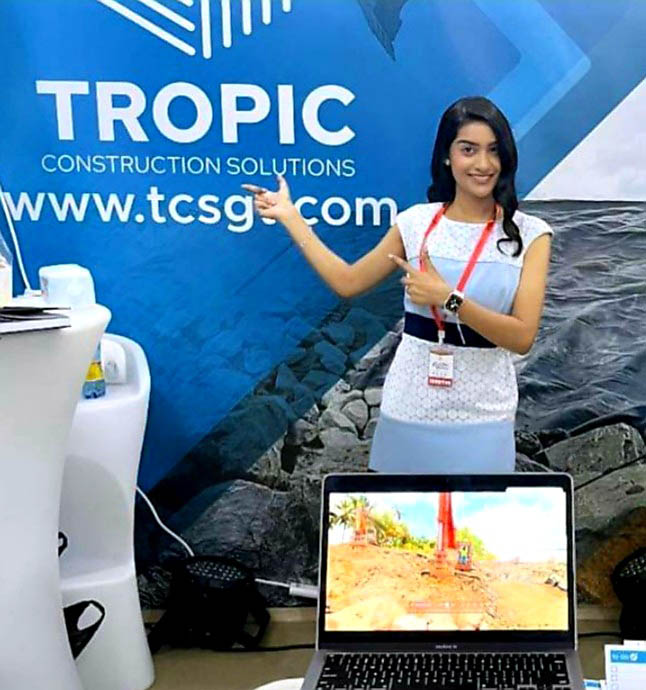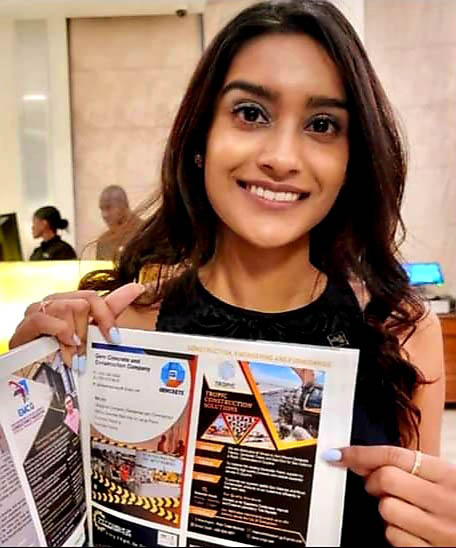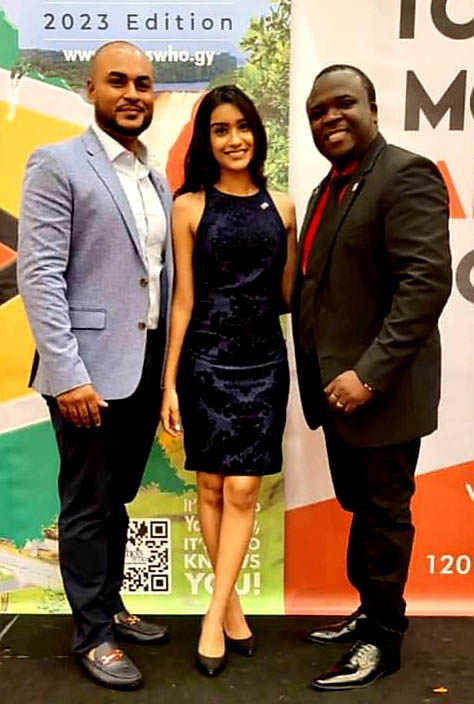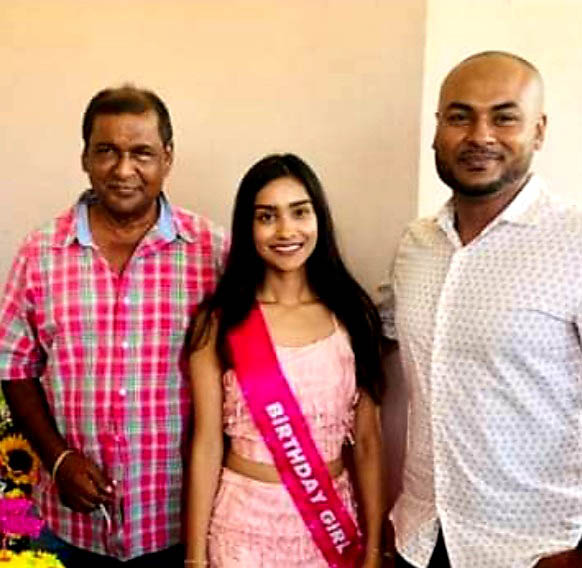Now four years into running her own business in the predominantly male-dominated, local, booming construction industry, Canada-born Guyanese entrepreneur Sonya Oodit, 28, is the only local businesswoman supplying a variety of geotextile fabrics for mainly sea defence and road construction.
Her goal is to make Tropic Construction Solutions the number one geotextile company in the country.
“I started with the purchase of one type of geo-textile fabric which is the woven PP80 (polypropylene) in 2019. It’s the most commonly used geotextile fabric in Guyana. I started selling that to a few small contractors who do sea defence works,” she told Stabroek Weekend in a recent interview.
Geotextiles are permeable fabrics, which, when used in association with soil, have the ability to separate, filter, reinforce, protect or drain.
Oodit made the choice to open a business while holidaying in Guyana after obtaining a bachelor’s degree in business administration and a diploma in finance from the University of Guelph – Humber. She obtained a loan from Citizens Bank and started up at Washington, West Coast Berbice.
During Covid-19 she began to import more of the geotextiles and as her customer base grew, she realised people wanted different options.
“They didn’t want to just purchase this one standard specific PP80. So I reached out to a European company and I started to buy geotextile fabrics from them and not only from China,” she related. She soon began to offer three types of geotextile woven fabrics, one from China and two from Europe.
Oodit then expanded her product range to include road fabrics. The white road fabric, which is non-woven and not as strong as the woven fabric, is used mainly for separation and filtration purposes of the materials used in road construction. “You can use it to separate the white sand from the loam. In 2021, we began selling six different types of fabrics,” she said.
To match the demand, Tropic Construction Solutions imported other kinds of construction materials such as the geogrids (geosynthetic material) that the Ministry of Works and other customers needed but were not readily available locally.
Recently she added geocells (cellular confinement systems that were created as an easy and durable material used for stabilising and protection) to the local market.
“All of these products are used mainly for roads and sea defence. I sell to both local and international customers,” she related.
Her customers include two of the main contractors in the construction of the four-lane highways. She has also supplied woven fabric to the contractors working on ExxonMobil’s head office in Ogle.
More recently she has obtained a contract to supply aggregates to the artificial island being built in the mouth of the Demerara River.
Deciding
Oodit, who was born in Toronto, Canada, spent her early childhood in Toronto but had her secondary education at Mahaicony Secondary School, West Coast Berbice. She then returned to Canada to attend college for two years followed by three years at university. During her first year of university her mother died.
“Throughout those last two years at university and even before that I always came home during the summer. Guyana has always been home for me. I have other relatives in Canada but my dad and brother are here so Guyana is home,” she said.
After graduating from university, she returned to Guyana in 2019.
“I was trying to figure out if I should stay and help the family business, MMB Construction, or return to Canada. I was here helping my dad, Rohan Oodit, the owner of MMB Construction and who is very involved in the construction industry. I still help him,” she related.
“I was deciding what I should do. I had a job offer in Canada. I was being pulled in opposite directions by the two places. I weighed the pros and cons and I knew I could achieve more in Guyana. I saw opportunities here. I could make more use of my qualifications here than in Canada. I would have less competition. I already had a foot in the door through my dad’s business. I already had an idea about what the market needed and what I needed to do.”
She scoped out the market for geotextile fabrics, which her father used. He occasionally sold those materials to his friends and other contractors from what he secured.
“Because he had so much going on, he wasn’t able to focus on providing the product on the open market. I thought I might as well just take that load off him and make a business venture out of it,” she said.
Having decided, Oodit got all her paperwork done and registered her business the same year she returned. She then secured the bank loan and bought her products. “Once I bought the first product, as soon as I made some money, I put that towards collateral. That was what helped me to grow. That was in 2020/2021,” she stated.
In the first year, her first shipment was three container loads. Last year she shipped in seven containers and for this year she has already had 15 containers of products.
“That is a lot of products. I have quite a few people buying from me now,” she revealed.
Innovative
Last year, she included personal protection equipment (PPE) in her stock and tried to encourage a more feminine look by using pink safety vests.
“I try to be innovative and unique with the type of products I offer. We have a lot of women in the construction and mining industries who are unable to get women’s vests. I have pink safety shoes for women. I have a few other options women can choose from. It was an idea I came up with last year. I tried to test the market to see how it would work. I am trying to not only set trends but standards as well,” she said.
Hers was the first local company to sell a safety vest that has a light on it. It can be used for road construction at night.
She realised there was competition in Georgetown for PPEs so she did not open a business in Georgetown but last year she opened a store in New Amsterdam where there is no occupational safety store.
“I am the only one with a specific occupational safety store in New Amsterdam. I’m not the only person who sells safety gear because you can go to the Chinese stores and pick up certain things. I don’t sell those. I sell things that you cannot find there, things that are unique. I try to stand out from the crowd,” she related. “Although we buy Chinese products, whatever we buy is in keeping with the ISO (International Organisation for Standardisation) standard that is required.”
With plans for the construction of a stadium in New Amsterdam and a hotel by a private developer, Oodit is confident that the construction industry in New Amsterdam will boom.
“I have spoken to the contractors. I don’t only wait for people to come to me. I go out and meet them. My brother and I, we are not those kids who were rich and loaf off of our parents. We worked hard for what we have,” she stated. Her brother, who remigrated to Guyana years before her, assists her with logistics, but he also has his own company.
She enjoys speaking to the contractors as she learns a lot from them and she shares her knowledge with them. “I have spoken with a few contractors on the phone. Usually when they saw me, they asked, ‘Are you Sonya?’ I am very small built and young so when they look at me, they probably ask themselves, ‘Who is this twit and where is she going?’ When they ask questions and I answer them and I throw back questions at them and they can’t answer me, I sometimes leave them baffled, I would like to think,” she said
Oodit is now working towards opening another branch of Tropic Construction Solutions by next year on the East Coast Demerara, closer to Georgetown.
She studies the specific requirements of the geotextiles required when bidding for contracts.
“So all of my products exceed the requirements. You can say I’m in an oligopoly market where there are only a few guys providing the products. I’m competing with the big guys and I’m the only woman selling a variety of geotextiles, geocells, geowebs and geogrids,” she said.
Climate change and rising waters is one of the reasons, Oodit has a variety of European geotextiles and not only Chinese that is stronger in stencils strength. “There are a few contracts that require the heavier strengths. Hopefully that helps to prevent or reduce erosion,” she said.
Last year Tropic Construction Solutions brought a different product, the perminator barrier, from the USA. “It is not a construction plastic. It is to prevent the moisture from the concrete going up into the building. It is a superior product to construction plastic that is used widely in Guyana. Some companies are buying that specific product to use in their buildings,” she added.
Her company is currently providing non-woven fabrics to the Chinese subsidiary company of Sinomach, China CAMC Engineering Company that is working on upgrading Enmore, Number 75 Village and Diamond hospitals.
“Bidding for these contracts requires a lot of time and a lot of paperwork,” she noted. Her staff is small. “I have no more than five people. One in New Amsterdam for the store. It is a small store. I have a Mississauga-based partner who handles the international logistics including helping with purchasing of products. My brother, Stephen, helps me with the logistics in Guyana, and he and another employee ensure everything is delivered to the warehouse. I have another employee who does the storage and inventory. Overall, I manage everything. I have a very busy lifestyle.”
Oodit works closely with her father’s company and assists him with his financing and administrative matters.
He does road construction and coastal defence projects. “When MMB bids to do these projects, I also assist in preparing the bids and I provide some materials for the jobs,” she added.
Oodit also submits her own bids to supply other types of construction materials like aggregates. Just recently she won a contract to supply aggregates to the Belgian company that is working on the artificial island. How does she manage this?
Her father’s company, MMB, owns a barge, trucks and other heavy-duty machinery. She makes good use of these means of transportation to deliver the products. The barge transports aggregates including boulders, gabions and crushed stones to meet the needs of contractors.
CSR
“MMB has trucks on the road every day. Through them I provide free delivery to customers in Georgetown because of our location in West Berbice. I have guys who buy from me from the Essequibo Coast, Leguan, Parika. When you buy from me in bulk, you get a discount. It is not only about money. It is about my reputation. It is about quality, standard and other things. To my loyal customers I may also include PPEs or safety vests as complimentary products. Every Christmas I also give customers’ packages to my loyal customers. Workers attached to my parent’s company can say they get a lot of products from me,” she said.
On her own, Oodit has a plan she is working on, as part of her corporate social responsibility (CSR), to plant some mangroves as a means of natural sea defence. As part of her CSR, she has responded to assisting a number of charitable organisations, something she did not speak about during the interview.
Last year, Oodit took part in ExxonMobil Foundation’s first sponsored Global Women in Management programme. She was one of 18 women to graduate from the first batch. “It was pretty helpful. It helped me with the Guyana market and stuff like that,” she said. She has also had discussions with people who sought her advice on how to start a business or who needed financial advice.
Asked if she misses Toronto, Oodit said, “I am enjoying Guyana. At first it took me a while to readjust. I found places that remind me of Canada, food wise. I like speaking to international clients. I like helping my local people.”
